The First Battle of El Alamein officially came to an end on 31 July when the British finally called off their attack on Rommel’s lines. Although it had ended in a stalemate, the battle had halted the German advance into Egypt and seriously weakened Rommel’s forces. In southern Russia, German troops crossed the Don and moved towards the Caucasus oilfields. Also this week, the RAF launched a series of incendiary attacks on the German city of Hamburg; over 42,000 people would eventually be killed in the raids.
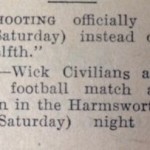 The John O’Groat Journal reported this week that grouse shooting would begin on Saturday 1 August and not on the more usual “Glorious Twelfth”. In the fields of Caithness
The John O’Groat Journal reported this week that grouse shooting would begin on Saturday 1 August and not on the more usual “Glorious Twelfth”. In the fields of Caithness 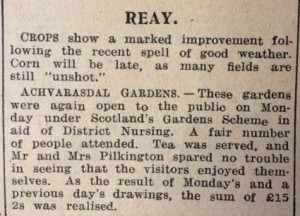 haymaking was underway; the Reay District News said that, “Crops show a marked improvement following the recent spell of good weather. Corn will be late, as many fields are still ‘unshot’”.
haymaking was underway; the Reay District News said that, “Crops show a marked improvement following the recent spell of good weather. Corn will be late, as many fields are still ‘unshot’”.
Wick Burgh Council agreed on 27 July to support the 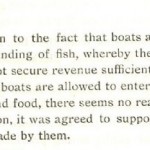 Harbour Trustees in their bid to let foreign vessels land fish at the harbour: “Attention was drawn to the fact that boats are prohibited from using Wick Harbour for the landing of fish, whereby the Harbour Trustees, who are heavily in debt, cannot secure revenue sufficient to meet their liabilities. It was pointed out that if boats are allowed to enter the harbour for securing supplies of ice, coal, oil and food, there seems no reason why they should not land fish.”
Harbour Trustees in their bid to let foreign vessels land fish at the harbour: “Attention was drawn to the fact that boats are prohibited from using Wick Harbour for the landing of fish, whereby the Harbour Trustees, who are heavily in debt, cannot secure revenue sufficient to meet their liabilities. It was pointed out that if boats are allowed to enter the harbour for securing supplies of ice, coal, oil and food, there seems no reason why they should not land fish.”
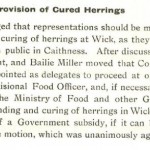
The Council also resolved that “representations should be made to the Ministry of Food to allow the curing of herrings at Wick, as they are a valuable food much desired by the public in Caithness.” Delegates were appointed to take the matter up with Government Departments, “so that the landing and curing of herrings in Wick may be authorised, plus the granting of a Government subsidy, if it can be obtained.”
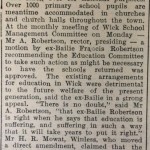 The John O’Groat Journal this week reported that the Wick School Management Committee wanted its schools returned. As the paper observed, “For the past two years Wick has had the use of only one of its four schools – the High School – the others having been taken over for national purposes. Over 1,000 primary school pupils are meantime accommodated in churches and church halls throughout the town.” The rector, presiding, was in full agreement: “’There is no doubt,’ said Mr A. Robertson, ‘… that education is suffering, and suffering in such a way that it will take years to put it right.’” Only one member, Mr H.R. Mowat of Winless, disagreed, stating that “the position was due to war exigencies, and that the Committee would be going against the national interests if they pressed for a return of the schools.” However, as the report pointedly concluded: “He received no seconder.”
The John O’Groat Journal this week reported that the Wick School Management Committee wanted its schools returned. As the paper observed, “For the past two years Wick has had the use of only one of its four schools – the High School – the others having been taken over for national purposes. Over 1,000 primary school pupils are meantime accommodated in churches and church halls throughout the town.” The rector, presiding, was in full agreement: “’There is no doubt,’ said Mr A. Robertson, ‘… that education is suffering, and suffering in such a way that it will take years to put it right.’” Only one member, Mr H.R. Mowat of Winless, disagreed, stating that “the position was due to war exigencies, and that the Committee would be going against the national interests if they pressed for a return of the schools.” However, as the report pointedly concluded: “He received no seconder.”
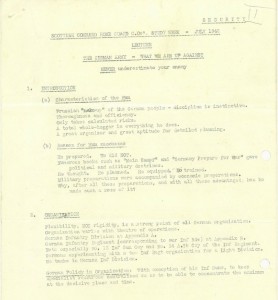
Finally this week, the Home Guard received a lecture on “The German Army – What We Are Up Against”, including “Characteristics of the Hun.” These national characteristics are surprisingly complimentary: “Discipline is instinctive … Only takes calculated risks … A great organiser and great aptitude for detailed planning.” Asking the “reason for Hun successes”, the lecture notes observe: “He prepared. We did NOT”, before posing the highly pertinent question: “Why, after all these preparations, and with all these advantages, has he made a mess of it?”
